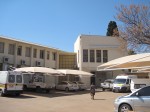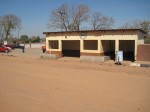From Chobe I transferred across the border into Zimbabwe to see Victoria Falls. One of the seven natural wonders of the world, Vic Falls has grown into just the sort of tourist trap that you would expect. There are 10 hotels, 2 grocery stores, and 13,000 specialty shops selling t-shirts to the market demographic that the Hard Rock Cafe used to dominate, along with the usual trinkets and Shona sculptures. As we come into town the driver points out that 100,000 people live in Vic Falls. When he says they live in Vic Falls, what he means is that they live in the slums barely visible behind the thick skirt of bush. We fly by on the tar road; from the window you can spot the occasional lean-to fabricated from plastic sheet, canvas of cardboard if you’re looking.
Like everyone else, I motor into town in an insulated, air-conditioned bus. This is the kind of traveling that makes the ladies at the bridge club comfortable. Everything looks safer behind the glass. Until a hawker with some Zimbabwe dollars slaps them against the pane, pleading for a sale. In 2008, the annual inflation rate in Zimbabwe was estimated at 14,800%. It is unclear if this figure was accurate because at the time, there were not enough goods on the shelves to perform a price comparison. $10 million dollars could be exchanged for 6 USD. Now, the Zimbabwe dollar has disappeared, relegated to novelty status, and is slapped on the windowpane of every passing motor coach. 100 trillion dollars. Please buy it for 1 USD.
So after my one hour hike though the falls, one of the most beautiful places in the world, I wander through town, watching fellow tourists buy “traditional” African trinkets and listening the ubiquitous sounds of the Lion King theme song. I sit on a bench and a hawker sits next to me. He likes my shoes. He motions to his, two sizes too small, and points out that his toes are curled under themselves, stretching the fabric taut. He likes my shirt, too, and wants to trade. I demand a wooden hippo the size of my arms spread wide. We strip a low hanging branch from a nearby tree to confirm the length of said hippo.
The following day he arrives at my hotel as promised, with two large and unsmiling friends, and three hippos. He no longer wants my shoes, or my shirt, but only money, to the tune of $250 USD. Did I mention yet that Mastercard is not accepted in the entire country? A British tourist told me that Mastercard is headquartered in the UK, and Mugabe hates the British. Or that I have only Mastercard? I offer him everything I have: 50 pula (7 dollars), 1 USD, one pair of stylish Kenneth Cole sport sneakers and tow t-shirts. Voices are raised. I will not get the hippo.
A security guard saves me from coming to blows with this man just as he starts demanding all of my money for his time. The same guard tells me later that they patrol the property at night and shoot anyone running in the bush. No questions, just aim for the leg.





















































